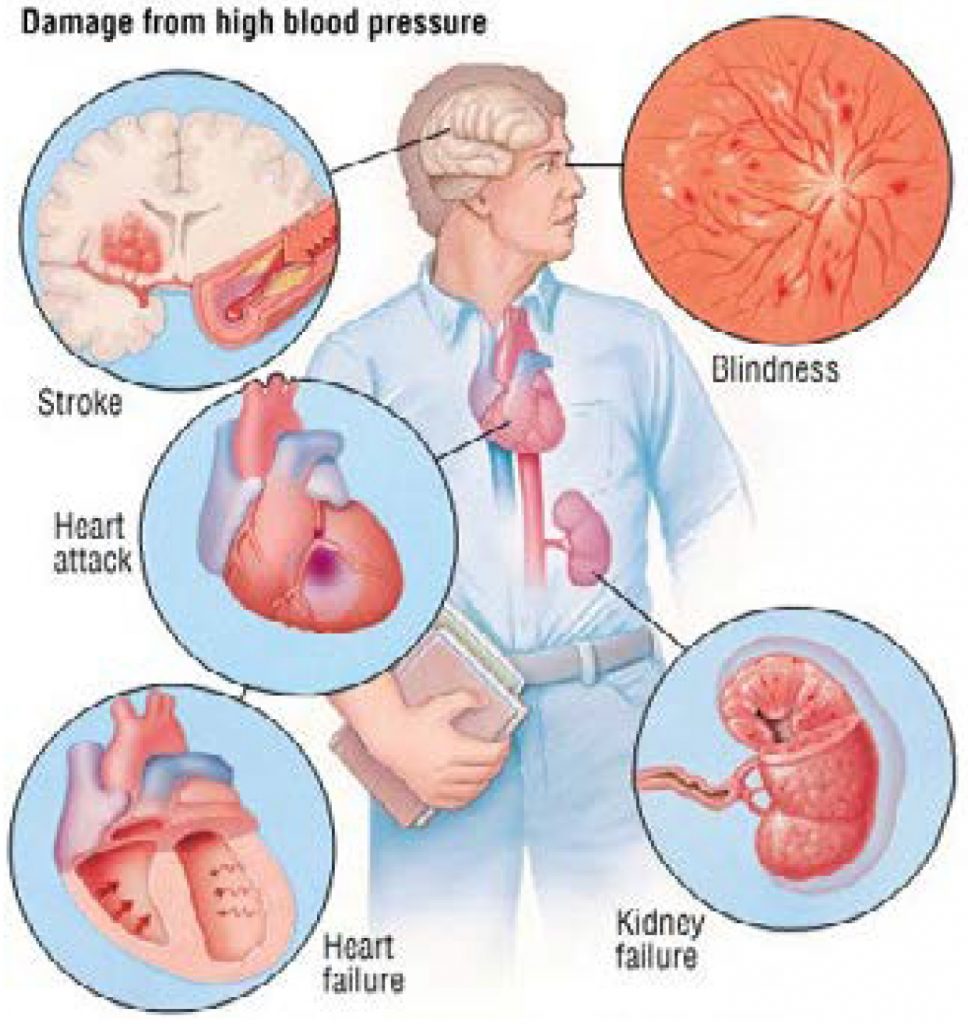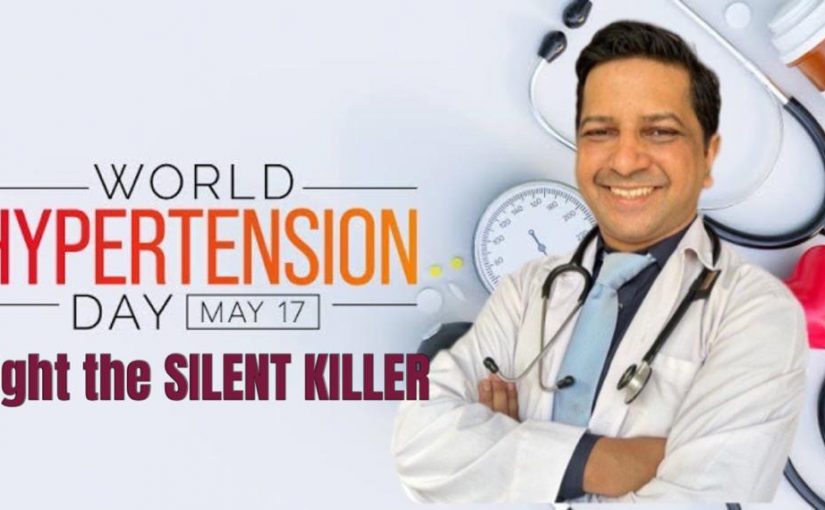On the 17th of May, World Hypertension Day, the Goan Observer team spoke to Dr. Amit Dias, from the Department of Preventive and Social Medicine at the Goa Medical College to understand Hypertension and its implications. Hypertension often remains undetected and leads to premature death. We need to pay attention to Hypertension and fight this SILENT KILLER.
Q1: Doctor why do we need to worry about Hypertension?
Ans: Hypertension does not just result in a rise in blood pressure- hypertension can lead to premature death. There are an estimated 1.28 billion people with hypertension in the age group of 30 – 79 years and what is worse is that almost 50 % of them do not know that they have this condition. Less than half the adults (42%) with hypertension are diagnosed and treated. It is a major cause of premature deaths worldwide. It is one of the major Public Health targets to reduce hypertension by 33% by 2030. Our fight against hypertension starts with everyone realizing that hypertension can occur in anyone and one needs to check their BP to find out.
Q2: Doctor what exactly is Hypertension?
Ans: Hypertension is more commonly known as High Blood Pressure. Blood pressure is the force that moves the blood through the circulatory system and is essential. However, when the pressure crosses the normal limit it can cause harm and even premature death- it needs to be detected and kept under control.
Q3. How often do we need to screen for hypertension and at what age?
Ans: In apparently normal individuals, those in the age group of 18-39 should screen themselves at least once in 3-5 years, while those above the age of 40 should do it annually.
Q4: We heard about Systolic and Diastolic BP.. can you simplify these terms?
Ans: Yes, the Blood pressure is measured as Systolic (the higher number) and Diastolic (lower number) pressure. Systolic pressure is the force of the blood against the walls of the artery as the heart contracts, whereas Diastolic pressure indicates the blood pressure when the heart relaxes or between the heartbeats. The readings are measured in mm of mercury and are written, for example as 130/84- where 130 is the systolic pressure and 84 is the diastolic pressure.
Q5: At what level would you say that a person has high BP?
Ans: The blood pressure cut-offs have kept changing over the years based on the evidence. The consensus is to aim for a normal blood pressure of 120/80 and keep the blood pressure lower than 140/90 mm of mercury.
However, the newer guidelines would label those with a systolic above 130-139 and a diastolic of 80-89 as Stage 1 Hypertension and those with a BP > 140 (systolic) and > 90 diastolic as Stage 2 hypertension.

Q6. What are the health problems associated with high blood pressure?
Ans: Chronic hypertension leads to a process called atherosclerosis; wherein there is a build-up of fatty material or plaques inside the blood vessels, narrowing them and thus further increasing the blood pressure. If this block happens to the blood vessels of the heart, it can lead to a heart attack.
Besides heart disease, it can also cause kidney disease. Kidney disease in turn can further raise the blood pressure as the electrolytes, including sodium, are not adequately excreted from the body. One can get a stroke, which is a block or rupture of a vessel in the brain leading to paralysis. It can damage the eye just like diabetes causing damage to the small blood vessels and leading to retinopathy. There are several complications of raised blood pressure including Alzheimer’s disease and death.
Consider you are blowing a balloon… if you blow too much air and increase the pressure, the balloon will burst. Something similar happens with high blood pressure- it either damages the blood vessels or in some cases the blood vessel may burst and the person may have a stroke depending on where the damage takes place. The goal is to detect blood pressure early, much before the damage is done and control the blood pressure.
Q7. What about medications for Hypertension?
Ans: There are several medicines available for the treatment of hypertension. You need to consult your doctor. Wherever possible, one must try and find the cause of the blood pressure and treat the root cause. However often, this is not known, and one must take appropriate treatment and adopt healthy lifestyle measures to control hypertension. The good news is that it can also be prevented by adopting a healthy lifestyle- restricting salt to less than 5 grams per day, diet control, avoiding fatty food and increasing the servings of fruits and vegetables, exercising at least 30 minutes per day, manage stress, lower alcohol intake, stop smoking, weight reduction and regular monitoring are some of the measures for hypertension prevention and control.
Q8: How can we Prevent Hypertension?
Ans: Adopting a healthy lifestyle early can help prevent hypertension. Detect it early and take appropriate care. Avoid smoking and alcohol, cut down on salt intake, exercise, meditate and eat a healthy diet containing fruits and vegetables. Follow the DASH Diet- Dietary Approaches to Stop Hypertension.
Q9: What are the initiatives taken at the global level?
Ans: To achieve the global target to reduce the prevalence of hypertension by 25% by 2025, WHO and the United States Centers for Disease Control and Prevention launched the Global Hearts Initiative. With its five technical packages – HEARTS (manage cardiovascular diseases), MPOWER (control tobacco), Active (increase physical activity), SHAKE (reduce salt consumption) and REPLACE (eliminate trans fat) – the Initiative aims to improve heart health worldwide.
The problem is huge and it is an easy risk factor to screen and treat. The impact achieved by early detection and immediate treatment can be significant. Hypertension is responsible for almost 60% of stroke deaths and 25% of the deaths due to heart ailment. Studies have revealed that almost 20% of the Indian adult population are having hypertension and the numbers are rising.
Q10. That is indeed a cause for concern. What is your message to the readers?
Ans: My message is in the theme for World Hypertension Day, this year – ‘Measure your Blood Pressure Accurately, Control it, Live Longer’. Now that you know about hypertension, do pay attention, and avoid tension. You can keep hypertension under control and live a healthy life- lifestyle changes are a must.
Remember to check your blood pressure. A person with high blood pressure may not have any symptoms for years, while it silently causes damage to the system. With changing lifestyles, it is becoming a major public health problem and cause of death- hypertension is often called a Silent Killer.
About the expert: Dr. Amit Dias is a senior faculty at the department of Preventive & Social Medicine at the Goa Medical College he has an MD in Preventive and Social Medicine and a Diploma in tropical Medicine form the London School of Hygiene and Tropical Medicine, UK. He has worked on ensuring optimal vaccine coverage for the children in the community.
